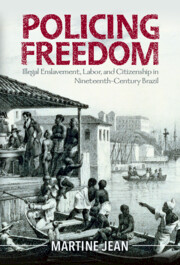
-
Select format
-
- Publisher:
- Cambridge University Press
- Publication date:
- 03 August 2023
- 17 August 2023
- ISBN:
- 9781009289146
- 9781009289115
- 9781009289153
- Dimensions:
- (229 x 152 mm)
- Weight & Pages:
- 0.68kg, 366 Pages
- Dimensions:
- (229 x 152 mm)
- Weight & Pages:
- 0.593kg, 366 Pages
- Subjects:
- Sociology of Race and Ethnicity, Area Studies, Latin American Studies, History, Latin American History
- Series:
- Afro-Latin America
You may already have access via personal or institutional login- Subjects:
- Sociology of Race and Ethnicity, Area Studies, Latin American Studies, History, Latin American History
- Series:
- Afro-Latin America
Book description
Policing Freedom uses the case study of Brazil's first penitentiary, the Casa de Correção, to explore how the Brazilian government used incarceration and enforced labor to control the prison population during the foundational period of Brazilian state formation and postcolonial nation building. Placing this penitentiary within the global debates about the disciplinary benefits of confinement and the evolution of free labor ideology, Martine Jean illustrates how Brazil's political elites envisioned the penitentiary as a way to discipline the free working class. While participating in the debates about the inhumanity of the slave trade, philanthropists and lawmakers, both conservative and liberal, articulated a nation-building discourse that focused on reforming Brazil's vagrants into workers in anticipation of slavery's eventual demise, laying the racialized foundations for policing and incarceration in the post-emancipation period.
Awards
Honorable Mention, 2024 Bolton Johnson Prize, Conference on Latin American History
Reviews
‘Brazil has one of the highest prison populations in the world -it comes third, after the US and China. Adopting a micro-global approach, Policing Freedom masterfully connects the history of prisons with the crisis of slavery and the transformations in labor regimes in the Atlantic world during the nineteenth century.’
Sidney Chalhoub - Harvard University
‘In this tenaciously researched and haunting study of ‘slavery’s afterlives in punishment,’ Martine Jean tells the stories of those confined in Rio de Janeiro’s first modern-style penitentiary. Rio’s Casa de Correção was an urban construction site, a social experiment, a warehouse of people, and ultimately, Jean shows, a crucible for post-abolition society.’
Amy Chazkel - Columbia University
‘This book is an invaluable contribution to the study of police and political control of the popular classes, mainly but not only Africans and Afrodescendants, in the largest slaving city of the Atlantic basin, Rio de Janeiro. It combines with originality a discussion of the end of the transatlantic slave trade, the decline of slavery, and the formation of an immense, modern prison complex aimed at maintaining seignorial dominion.’
João José Reis - Universidade Federal da Bahia
‘This book offers a thought-provoking meditation on the continual reinvention of unfreedom, with chilling reverberations for today. … Recommended.’
B. A. Lucero Source: Choice
‘A meticulous study of a nineteenth-century history that continues to resonate strongly in the present. Jean’s work reflects both an enormous command of relevant secondary literature in English and Portuguese as well as a detailed understanding of the official records documenting the politics, policies, and objectives that shaped the Casa de Correção and Rio’s transition from home to the largest urban enslaved population in the Americas to a racialized republic.’
Christina Proenza-Coles Source: H-Net
‘… the book is an essential read for scholars interested in the connection between punishment and work in the Brazilian legal experience of the 19th century …’
Marjorie Carvalho de Souza Source: Rechtsgeschichte - Legal History
‘Policing Freedom offers important contributions to the historiography of slavery and the slave trade, the lives of liberated Africans, and the intersection between national politics and the making of criminal justice and prison systems in nineteenth-century Brazil.’
Marcelo Rosanova Ferraro Source: International Review of Social History
Contents
Metrics
Altmetric attention score
Full text views
Full text views help Loading metrics...
Loading metrics...
* Views captured on Cambridge Core between #date#. This data will be updated every 24 hours.
Usage data cannot currently be displayed.
Accessibility standard: Unknown
Why this information is here
This section outlines the accessibility features of this content - including support for screen readers, full keyboard navigation and high-contrast display options. This may not be relevant for you.
Accessibility Information
Accessibility compliance for the HTML of this book is currently unknown and may be updated in the future.

